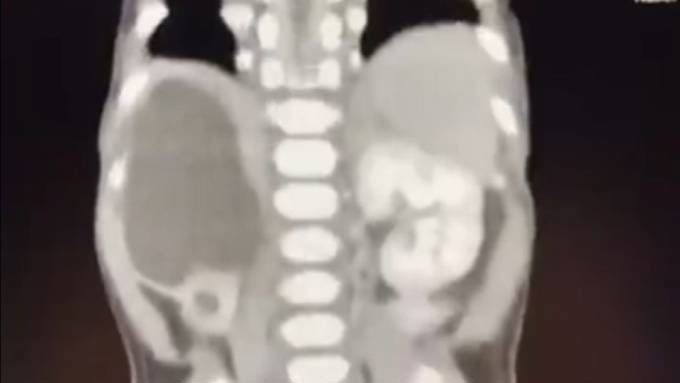A Baby in Brazil is Among the 1% of the World’s Population Born with Four Kidneys.
Baby Isis Eloah Ferreira Alves was born prematurely via cesarean section in Brasília and spent her early months in the neonatal intensive care unit. It was only after she underwent surgery at five months old that doctors confirmed she has two extra kidneys. This condition, known as duplicated kidneys or supernumerary kidneys, occurs in just 1% of the global population.

X-ray image showing the kidneys in the girl’s body. (Image: Jam Press).
“It is very rare for someone to be born with a complete extra set of kidneys. One case occurs in a million people,” said Niaz Ahmad, a transplant surgeon at St James’s University Hospital in Leeds, to the Guardian.
Doctors realized that Isis had kidney issues while she was still in her mother Thalia Silva Alves’s womb, but they were uncertain about the specifics of the condition.
The 13-month-old girl had to have her upper right kidney removed because its size was causing pressure on other organs. Isis’s remaining three kidneys are functioning normally.
Pediatric urologist Hilo Buson, who performed the surgery on Isis, told local media: “People may wonder if these kidneys will cause problems in the future. They might, but it is also possible that nothing will happen. Therefore, long-term clinical monitoring is necessary, possibly until she reaches adulthood.”
Thalia, a 21-year-old single mother from Formosa, expressed, “My daughter is truly unique.” She noted that her daughter’s extra kidney cannot be donated due to abnormal blood vessels.
Kidneys are not the only organs that can be duplicated at birth. A more common case is women born with two uteruses. Approximately 1 in 1,000 women in the UK is affected by this condition. In 2006, Hannah Kersey from Northam, Devon, gave birth to three children from both of her uteruses. Her identical twins, Ruby and Tilly, were born from one uterus, while Grace was born from the other. Both Hannah and her sister have two uteruses. According to BBC, the likelihood of having triplets from two uteruses is about 1 in 25 million, and the probability of a woman with two uteruses having twins or two separate births is estimated at 1 in 5 million.

















































